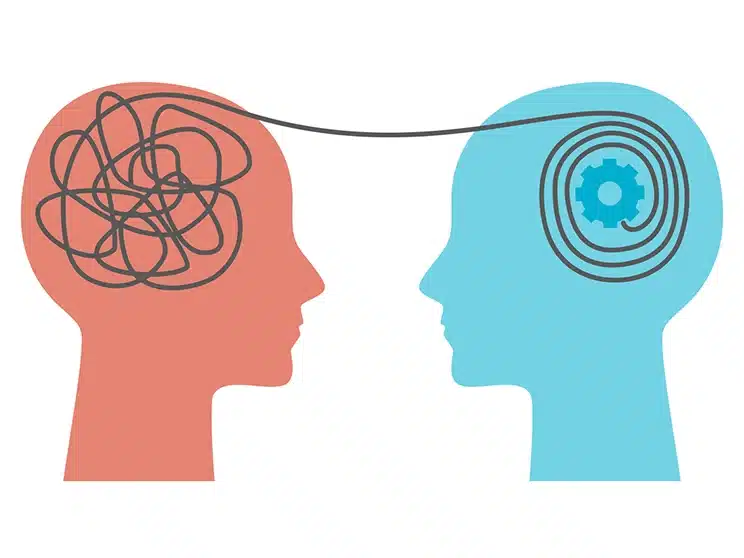Everything You Need to Know About Social Learning Theory
Updated: June 19, 2024
Published: August 24, 2021

What is social learning theory? Social learning, a theory introduced in 1977 by Stanford psychology professor Albert Bandura, suggests that people learn through observation, imitation, and modeling. His theory proposes that by watching others, a person encodes the observed behavior and, later, uses this information as a guide to action.

Three central ideas of Bandura’s social learning theory include:
- Observational learning
- Powerful mental processes are involved in this type of learning
- Reinforcement and punishment influence behavioral learning
- Observational learning does not necessarily lead to behavior change
Observational Learning
The famous Bobo doll experiment demonstrated how people could learn through observation. In the experiment, adult researchers verbally and physically abused a doll in front of children. When the children were later allowed to play with the doll in a room, they mimicked the aggressive behavior they had previously observed.
Bandura used his findings in the Bobo doll experiment to develop the social learning theory in the late 70s. That said, this type of learning is not limited to watching someone in real life engage in an activity. Observing fictional characters in books and movies, as well as listening to podcasts, can initiate social learning.
The main idea of social learning theory identified by Albert Bandura include:
- A verbal instructional model comprises behavior description or explanation, such as listening to a podcast.
- A symbolic model comprises real or fictional characters in online videos, TV programs, novels, or movies.
- A live model is a person demonstrating a behavior in real life.
In short, observational learning can be directly through social interactions with those around us or indirectly through media, according to Bandura.
Observational Learning Does Not Necessarily Lead to Behavior Change
Learning is instantly evident when you display new behavior after observing someone else. However, social learning theory proposes that you can learn new things without demonstrating new behaviors. That’s where cognitive mediational processes (mental factors) come in.
Cognitive Mediational Processes in Social Learning Theory
When Bandura introduced the social learning theory in 1977, the approach needed to account for the role of thought processes in behavior imitation. The initial theory didn’t consider humans having cognitive control over their actions. The psychologist discovered that observing others doesn’t automatically mean you’ll mimic them.
For this reason, Bandura updated his theory in 1986 by renaming it to social cognitive theory and accounting for mental mediators in observational learning. The Stanford professor proposes that there are four mediational processes in observational learning, which are also the four stages and key features of the social learning theory:
- Attention
- Retention
- Reproduction
- Motivation

Learning through Observation
Attention
The first stage of the social learning process is whether you notice the behavior and pay attention to its consequences. To be able to imitate behavior, it must grab your attention. Any distractions will negatively influence observational learning. Think of attention as the degree to which you notice the behavior.
Retention
Once a behavior has your full attention, the next thing is how well you can remember it. Imitation is impossible if you can’t remember observed behaviors to guide your actions at a later time. Retention is critical to behavior modeling since social learning is not instant. So while you may notice an action, you can’t mimic it unless a fixed memory is formed.
Reproduction
You’ve paid attention to a particular behavior and retained the memory of it. The third stage of social learning deals with the ability to perform observed behavior. For those who can, the old idiom ‘practice makes perfect’ applies here. Some may want to but cannot perform the behavior due to particular constraints, such as a lack of required resources.
Motivation
This is the final and essential stage of the social learning process. It’s where you decide to imitate or ignore the behavior after assessing its consequences from someone else’s experience. Reinforcement and punishment play a critical role here.
Reinforcement is the reward for imitating the observed action, which could be social acceptance or approval by a specific person or group. The social learning theory proposes that reinforcement does not always have to come from external sources to foster behavioral learning.
A person’s internal motivation (intrinsic reinforcement) plays a critical part in whether an observed behavior is learned. Examples of internal reinforcement are pride, accomplishment, and satisfaction.
On the other hand, punishment is a consequence that reduces the likelihood of adopting the observed behavior.
This social learning stage focuses on weighing the perceived rewards and the perceived costs of imitating a particular action. You’re more likely to imitate rewarded behaviors than you’re to adapt those that are punished.
Learning through Observation
The social learning theory suggests that observational learning is only possible through powerful cognitive processes. These mental factors intervene to determine whether or not you acquire a new behavior through observation.
In other words, just because you observe someone else’s actions doesn’t necessarily mean you’ll imitate them. Instead, you first consider the behavior’s consequences to determine whether or not you mimic it. The thought process before imitation is called the cognitive mediation process.
The Value of Social Learning Theory
Most adults in the workforce want to continue their education, whether it’s a master’s degree, bachelor’s degree, or associate’s degree. The social learning theory has hugely impacted the education sector today. Albert Bandura observed that learning would be challenging if it were only possible through personal experience.
Observational learning is critical in attaining new knowledge and skills. Understanding the social learning theory helps you appreciate the power of observation in learning. It shapes the skills you know and the things you do. Leverage observational learning to understand how others influence your behavior.
Leveraging Social Learning Theory for the Most Effective Way to Learn
When continuing your education as an adult or earning an additional degree, social learning theory can help you to acquire knowledge more effectively and sharpen your skills. Just ensure you determine what you want to learn, maintain the desire to learn it, acquire the necessary resources, and take action.
Bottomline
When looking to increase your education, you want an institution that personalizes programs for adults. University of the People makes education accessible to adult learners. The institution considers the difficulties that adult students face. You get flexible schedules to study while simultaneously working and having time for family. You also access tuition-free degree programs.
